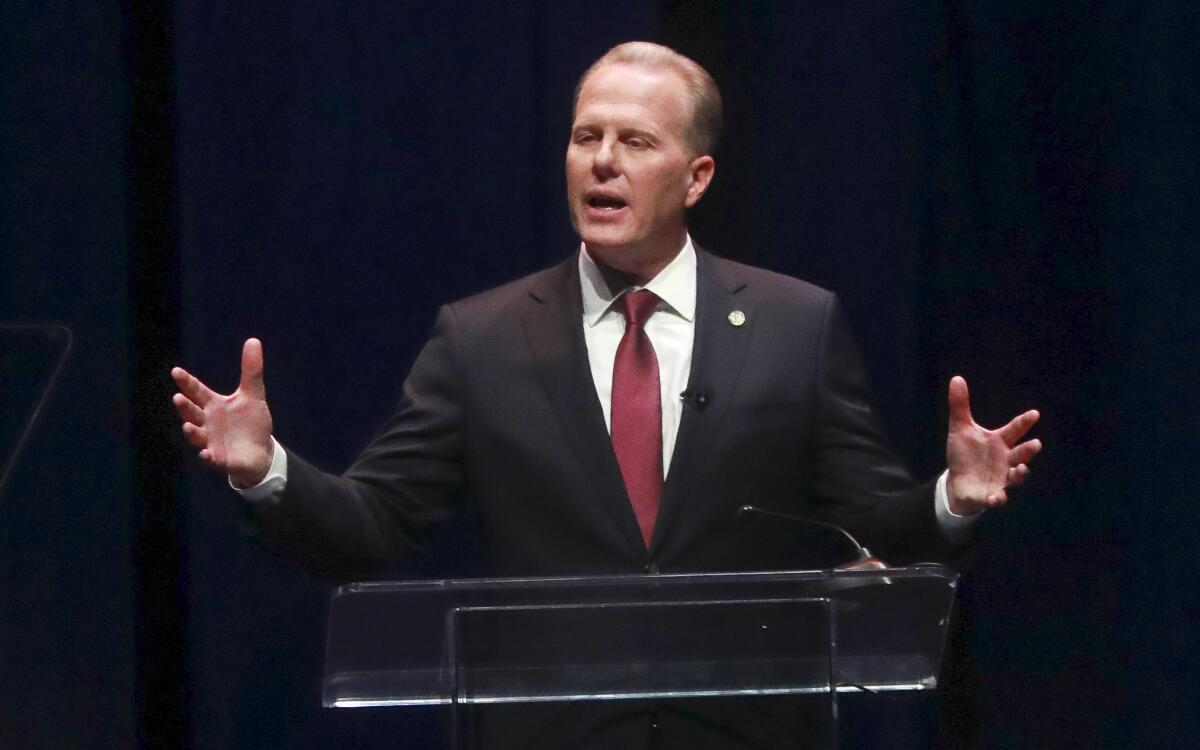Column: Kevin Faulconer is the GOP’s best and only hope to regain ground in California

- Share via
SACRAMENTO — The only Republican politician with a credible chance of winning major office in California is moving into position to possibly challenge Gov. Gavin Newsom in 2022.
He’s San Diego Mayor Kevin Faulconer, 53, a rare Republican moderate who has been elected twice to lead a heavily Democratic city.
Faulconer isn’t saying he’ll run against Newsom when the Democrat is up for reelection. The termed-out mayor probably hasn’t decided. But he is talking to people about it — consultants, potential donors, disheartened GOP pols.
The most significant thing he’s doing is starting to plan a homelessness initiative to place on the November 2022 ballot. That raises eyebrows.
Why would an out-of-office politician sponsor a ballot initiative at a time he’d ordinarily be focusing on his next career? Answer: He must see his next career as governor.
But here’s a little dampener to that theory: He has been a homelessness crusader for years, since he first became mayor in 2014.
“He’s not jumping onto the issue because he perceives it to be politically beneficial,” says Jim Brulte, former California Republican Party chairman and, before that, GOP leader in both legislative houses. “Homelessness is something he’s talked about most of his career.”
Still, it’s not uncommon for gubernatorial aspirants to use initiatives to bolster their statewide image. Newsom did it with initiatives that tightened gun controls and legalized non-medicinal marijuana. Arnold Schwarzenegger sponsored a successful ballot measure that enhanced after-school programs. Then he ran for governor.
Unlike those two, Faulconer would be pushing a ballot initiative at the same time he was running for governor. The last gubernatorial candidate to try that was Democratic Atty. Gen. John K. Van de Kamp in 1990. He was promoting three initiatives and it got awkward — he lost in the Democratic primary to former San Francisco Mayor Dianne Feinstein.
When I asked Faulconer whether he was eyeing the next governor’s race, he answered as expected: “My sole focus is on finishing strong in my last year as mayor. I love the job.”
But what does it matter if any Republican runs for major office in California? The GOP hasn’t won a statewide office since 2006. Democratic voters outnumber Republicans by nearly 2 to 1. Independents even outnumber Republicans.
But Faulconer has defied the odds by being elected in a city where the registration now is 42% Democratic, 21% Republican and 31% independent. He won a landslide reelection in 2016. So he’s attracting moderate Democrats and independents.
Here’s why: Faulconer can be labeled a fiscal conservative, but he’s a social moderate — like lots of California voters.
He supports abortion rights, same-sex marriage and a path to citizenship for immigrants living in the U.S. illegally. He opposes President Trump’s proposed border wall. And he has never endorsed Trump. On guns, he’s OK with California’s strong controls. Unlike Newsom, however, he supports capital punishment — as do California voters.
Faulconer grew up in Oxnard, where he learned to speak fluent Spanish in elementary school.
Then-U.S. House Majority Leader Kevin McCarthy (R-Bakersfield) tried to talk Faulconer into running for governor in 2018. He was trying to strengthen the GOP ticket and give the party faithful a reason to vote. The mayor thought about it and wisely turned down the invite. Republicans got crushed.
“Faulconer’s the only potentially viable Republican from the ranks of elected officials who could plausibly make a credible run” in 2022, says GOP consultant Rob Stutzman, a former Schwarzenegger advisor.
“He’s kicking the tires and is open to it.”
Allan Zaremberg, president of the state Chamber of Commerce, says: “You don’t have to be a political genius to know that he is the only Republican who has any chance” of being elected governor. “There really isn’t anybody else who has the ability to raise money and run on a track record.”
That track record is especially impressive when you consider that the San Diego City Council is controlled by Democrats. Fortunately, local governments are officially nonpartisan, so politicians aren’t as polarized as they are in Sacramento and Washington.
Faulconer’s record has a heavy emphasis on the voters’ current top concern, homelessness, and also affordable housing.
San Diego’s homeless population has declined by 9% since Faulconer became mayor. The city has built shelters that offer services for those struggling with mental illness and substance abuse, and provided parking lots for people to sleep in their cars and storage centers to stash belongings.
Faulconer’s initiative will have carrots and sticks, he says — not just shelters, but services, and requirements that homeless people use them.
“There has to be incentives and consequences,” the mayor says.
“If you think someone who is addicted to drugs and sleeping in a canyon is going to turn their life around without an intervention, you’re not being honest…. Some say it’s not compassionate to take people off the street. But I say it’s not compassionate to let people die there.”
One key question is whether the largely conservative California GOP would accept a moderate candidate for governor. Answer: Yes, if they really wanted to win. If not, they could just keep on grousing about one-party rule.
“If he wants to run, I don’t think he can be coy about it,” says former Republican strategist Ken Khachigian, who has managed several races in California. “A big question is does he have [former Gov.] Pete Wilson’s drive to devote 2½ years to barnstorming the state, collecting chits, building a fundraising base and shaping a winnable message?”
We’ll find out. If he does, there’s still faint hope for the California GOP.
More to Read
Sign up for Essential California
The most important California stories and recommendations in your inbox every morning.
You may occasionally receive promotional content from the Los Angeles Times.











